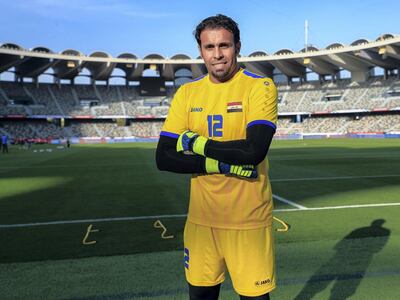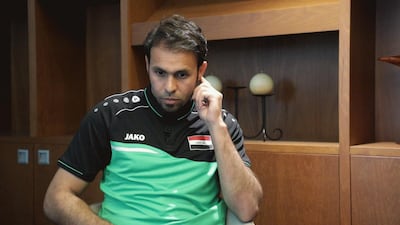It was a sporting fairy tale. In 2007, warring, divided Iraq was temporarily brought together as the country’s footballers – a team of Sunnis, Shiites and Kurds – wrote one of the greatest underdog stories of all time.
Mohammed Kassid was a backup goalkeeper in the team that, against all odds, lifted the Asian Cup. Now he is Iraq’s captain and the last member of that history-making squad still active in the national side.
The win, Kassid says, had a meaning that went beyond sport. When the team won 1-0 against Saudi Arabia in the final, it delivered joy to Iraqis at a time when they were “living a tragedy”, torn apart by conflict and sectarianism.
He remembers being unable to travel to his club at the time, Al-Zawraa in Baghdad, to train because of the perilous security situation.

“I cannot forget it,” says Kassid, 32, from his team’s Abu Dhabi base. “What the team achieved is engraved in my memory. It is saved in the history of my life.”
His face still lights up at mention of the tournament. He shows an old picture of himself celebrating with teammates, which he uploaded to his Instagram page on Sunday.
Within hours, it received thousands of likes from Iraqis who remember the victory just as fondly. While the situation in Iraq has fluctuated since then, Kassid insists the 2007 win delivered a lasting legacy.
Now playing for Al Quwa Al Jawiya, another Baghdad club, he says Iraq today feels normal because of the improved security.
“We were able to bring joy and annihilate sectarianism, to form one unified Iraqi people,” Kassid says. “Had it not been for the football and winning the Asian Cup, Iraq would not have united.
“Allah granted us this victory and the championship of Asia to bring back to Iraq. It united the Iraqi people.”
Victory in the 2007 tournament, played far away in South-East Asia, was all the more remarkable because the team’s build-up was mired in chaos and tragedy.
The squad’s physiotherapist was killed by a car bomb in Baghdad while the players were preparing for the tournament. The manager, Brazilian Jorvan Vieira, had been in the post for just two months.
Many of the players and staff had lost loved ones to conflict or faced threats from insurgents after the US-led invasion in 2003. It was far from certain that the Iraqi team would even make it through the group stages.
________________
Read more:
Bringing Asian Cup joy to war-torn Iraq
Biggest ever Asian Cup to bring economic boost to UAE
Syria vs Palestine emerges as the hottest ticket
The Emirati superfan whose tears won hearts now dreams of glory at Asian Cup
Bernd Stange counting on Syria fans to carry team through 2019 Asian Cup group phase
________________
Even as the tournament progressed, the players were met with grim news from home. After they reached the final, the group learnt that suicide bombers had struck, killing dozens of fans and wounding many more who had taken to the streets of Baghdad to celebrate.
Any talk of abandoning the tournament because of the tragedy was quickly silenced, with the players vowing to win in honour of the dead.
When they delivered, the masses reclaimed the streets at home.
For once, gunfire did not signal a new wave of violence. Iraqis fired weapons into the sky in tribute to their heroes. (US military helicopters suspended their regular patrols.)

Thankfully, the problems in the run-up to 2019 for Iraq have been of a different sort. The team has struggled for consistent form, as rumours persist that Srecko Katanec, the former UAE manager, has yet to win them over.
Meanwhile, a recent investigation dug up a number of falsified documents, casting doubt on several of Iraq’s most talented young players’ ages.
Mohammed Dawood, the top scorer at the under-16 championships two years ago, has reportedly been playing under a date of birth three years younger than his real age.
Yet Kassid, who is undisputedly Iraq’s oldest player, is not ruling out another victory.
“To be honest, we did not expect to win the Asian Cup in 2007,” he says. “Prior to the Asian Cup championship we played against South Korea and Uzbekistan. We lost both matches.
“Then we participated in the championship and we had a draw with Thailand in our first match.”
It was only after victory over Vietnam in the quarter-final, he says, that the squad really came to believe they could take the trophy back to Baghdad. They will play their first match of the 2019 finals against the Vietnamese this evening.
This incarnation of the Lions of Mesopotamia, as Iraq’s footballers are known, will be able to draw on the experience of national heroes other than Kassid.
Younis Mahmoud, the Iraqi football legend who scored the winning goal on that famous night in Jakarta, is in contact with the players, as are other 2007 champions.
“All of the players, including Younis Mahmoud, are following up with the players,” Kassid says. “Players such as Nashat Akram, Bassim Abbas and Mahdi Karim are still in touch with us as well.”
But Kassid, who has made 82 appearances for Iraq, knows that on the pitch tonight it will be him that his compatriots look to for inspiration.
“As a captain of Iraq, for the more than 30 million people I represent, I am the leader,” he says.
“This is indescribable, I am extremely, extremely happy. At the same time I have a great responsibility.”





